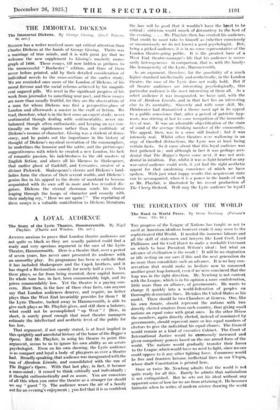A LOYAL AUDIENCE
The Story of the Lyric Theatre, Hammersmith. By Nigel Playfair. (Chatto and Windus. 16s. net.) ArryosE anxious to prove that London theatre audiences are . not quite so black as they are usually painted could find a ready and very specious argument in the case of the Lyric Theatre; Hammersmith. Here is a theatre that, over a period of seven years, has never once presented its audience with an unworthy play. Its programme has been so catholic that it has included Shakespeare and the Capck brothers, and it has staged a Restoration comedy for nearly half a year. Yet these plays, so far from being resented, drew capital houses: Its whole tone has, in fact, been commendably high, and its prices commendably low. Yet the theatre is a paying con- . cern. How then, in the face of these clear facts, can anyone say that London audiences deserve, and require, no better plays than the West End invariably provides for them ? If the Lyric Theatre, tucked away in Hammersmith, is able to give such plays as Mr. Playfair gives, and still show a balance, what could not be accomplished " up West " ? 1kre, in short, is surely proof enough that most theatre managers estimate the intellectual and aesthetic level of the public far too low.
: That argument, if not openly stated, is at least implied in this sprightly and anecdotal history of the home of the Beggar's Opera. But Mr. Playfair, in using his theatre to point this argument, seems to us to ignore his own ability as an astute psychologiSt. Even on his own showing, the Lyric audience is as compact and loyal a body of playgoers as ever a theatre had. Broadly speaking, that audience was inaugurated with the run of Abraham Lincoln, and consolidated with the run of The Beggar's Opera. With that last play, in fact, it became a mass-mind ; it ceased to think critically and individually ; it thought enthusiastically and en masse. You are conscious of all this when you enter the theatre as a stranger (or should we say " guest " ?). The audience wears the air of a family out for an evening's enjoyment ; you feel that it is so confident the fare will be good that it wouldn't have the heart to be critical ; criticism would smack of discourtesy to the host of
the evening Mr. Playfair, then, has created his audience.
That credit he must take to himself as (whether consciously or unconsciously we do not know) a good psychologist. But,.
being a picked audience, it is in no sense representative of the London theatre-going public. It is the greatest bane of a West End theatre-manager's life that his audience is neces- sarily heterogeneous in comparison, that is, with the family- like homogeneity of the Lyric, Hammersmith.
As an argument, therefore, for the possibility of a much higher standard intellectually and aesthetically, in the London theatre, the ease of the Lyric does not really hold. But if all theatre audiences arc interesting psychologically, this particular audience is the most interesting of them all. As a select audience it was inaugurated, we have said, with the run of Abraham Lincoln, and in that fact lies an interesting clue to its mentality. Sincerely and with some skill, Mr. Drinkwater had dramatized a theme most apt in its appeal to a public conscience that, after a period of patriotic hyp- nosis, was stirring at last to some recognition of the immorali- ties of war. It was an admirable objectification of the state of mind of the average thinking member of the community. The appeal, then, was in a sense still limited ; but it was intensely real. Whilst other theatres were wallowing in an orgy of tinselled distractions, the Lyric was at least facing certain facts. So it came about that this loyal audience was first gathered in ; and although in fact it was perhaps acci- dental that The Beggar's Opera came next. it was not acci- dental in intuition. For, whilst it was as light-hearted as any war-sated audience could wish, it yet had the right aesthetic appeal for that awakening conscience of which we have spoken. With just what happy results this acquiescent state can be accompanied, when it is a power in the hands of such as Mr. Playfair, is illustrated by his recent production of The Cherry Orchard. Well may the Lyric audience' be loyal I






































 Previous page
Previous page